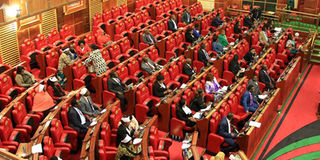Let voters have a say in nomination of MPs

Members of Parliament debate the gender bill on November 21, 2018. Voters should be involved in the process. PHOTO | JEFF ANGOTE | NATION MEDIA GROUP
What you need to know:
- So much sovereignty of the people is lost when nomination to Parliament of so many members is left to political leaders.
- It is imperative that total deference to the spirit of the Constitution and sovereignty of the people be reflected upon.
One of the requirements in the 2010 Constitution was for Parliament to give effect to Article 81(b) that “no more than two-thirds of members of elective public bodies shall be of the same gender”.
The High Court in 2017 under a petition filed by the Centre for Rights, Education and Awareness ordered Parliament and the Attorney General to take steps to implement the constitutional requirement within 60 days. The deadline lapsed on June 29, 2017 before this was met.
In 2015, an amendment was published by the Justice and Legal Affairs Committee of the National Assembly proposing changes to various relevant laws but this failed to meet the two-thirds majority vote threshold in Parliament.
Fast forward to this year and publication of the Constitution of Kenya (Amendment) Bill 2018.
RIGHT
It was hoped that this time round, given the near unanimous endorsement by top political leaders, the bill would pass when brought back to Parliament.
Unfortunately this did not happen. Nevertheless, we should note a few facts. The contemplated Article 97 (A1) insertion says a person elected to Parliament or County Assembly under Article 97(1) shall be eligible for re-election for one final term.
This, however, does not accord with the Constitution as it seems to refer to nominated MPs while in reality, it refers to the elected MPs.
I am not sure if MPs have taken cognisance — that they are eligible for re-election for only one final term! This is because currently Articles 97(c) and 98(b)(c)(d) make reference to nominated MPs who seem to be the target of the proposed Article 97 (1A).
One important aspect of the Constitution that has been overlooked is Article 38, which provides that every citizen is free to make political choices, including the right “to be a candidate for a political office, or office within a political party of which the citizen is a member and if elected, to hold office”.
NOMINATION
Therefore, when MPs view the implementation of Article 81(b) they need to make sure that Article 38(a), which the drafters deliberately imported from Chapter 4 of the Bill of Rights, is given due regard.
More importantly, it is classified as a right under the fundamental freedoms that must not be lost to proponents of the two-thirds gender rule.
Firstly, that citizen exercise sovereign rights are not granted or taken away from an individual by the State, meaning voters have a right to elect their representatives.
The fundamental question therefore is: Are nominations as proposed in the amendment equated to elections? Secondly, why should the political party be the one to nominate the MPs?
At what point is the citizens’ sovereign right to elect transferred to party overlords? Further, under Chapter 16, Article 38 falls within the Bill of Rights and hence any amendment touching on it must be approved through a referendum.
REFERENDUM
This is contrary to the report published by the Chairperson of Departmental Committee on Justice and Legal Affairs which states “pursuant to the communication by Hon Speaker on August 2015 (on whether the bills to amend the Constitution may be amended by the House), the Speaker guides that no amendment could be proposed in regards to a bill to amend this (unless there is anything extraordinary in the proposed bill that will require application of the extra ordinary measures)".
It is crucial for Parliament to be aware that despite the possibility of passing the proposed amendments, the President can invoke Article 256 5 (1A) which requires him to forward the bill to the Independent Electoral and Boundaries Commission to conduct within 90 days a referendum for the approval of the bill consistent with Article 255(2).
So much sovereignty of the people is lost when nomination to Parliament of so many members is left to political leaders.
DEMOCRACY
Technically, out of elected MPs in 290 constituencies, there is a possibility of one-third being nominated. To whom do they owe loyalty?
This needs to be addressed in view of the potential compromises to the very essence of democratic principles and also because of public resources at stake
Therefore, despite the nobility of the proposed amendment to comply with the Constitution, it is imperative that total deference to the spirit of the Constitution and sovereignty of the people be reflected upon.
Mr Kabage is Advocate of the High Court of Kenya; [email protected]





